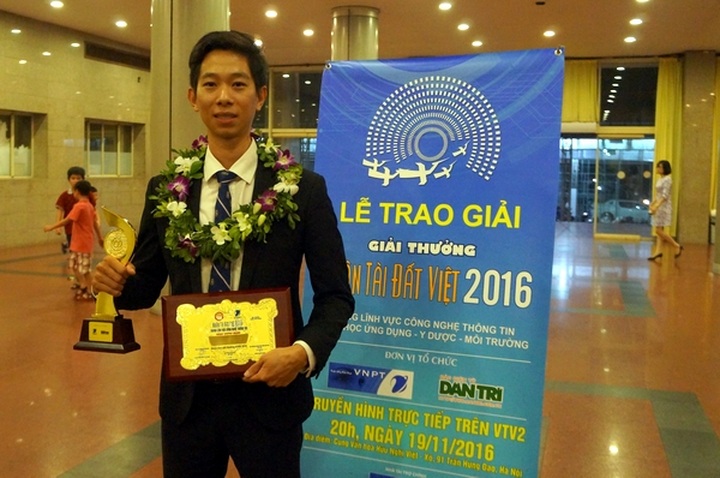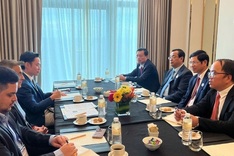Le Cong Thanh, head of InfoRe JSC, winner of Promising IT Products category at the Vietnamese Talent Awards 2016 talked about his past experiences in developing a start-up business.
Thanh won first prize for Promising IT Products category for his SMCC product - The semantic analysis system and social networks interactive management product.
The system collects and analyses information on social networks. It has all the functions of software as a service and deep learning technology to deal with Vietnamese text.
Le Cong Thanh is a familiar name in the start-up community. He studied abroad before returning to Vietnam. Thanh said in an interview with Dantri/DTinews that start-ups aren’t easy.

Le Cong Thanh, head of InfoRe JSC, winner of Promising IT Products category at the Vietnamese Talent Awards 2016
What's the idea that started it all?
We targeted students who are studying or working overboard and wanted to contribute to Vietnam. We got it started with Lietsi.com project which let the community help digitalise information about war dead and their graves in Vietnam.
It was developed in 2012 and collected nearly 750,000 records. It's a non-profit project and we have the families of war dead submit the information every week. In the meantime, we also wanted to integrate technology into business. SMCC is a result after we see the blossoming of information on the internet. This system will help analyse and exploit this information.
How long did it take to develop SMCC?
We already had this idea in 2012 but only followed the start-up model and called for funding earlier this year. After receiving some small funding, the project got off the ground and developed quickly. Before we had any funding, it was research.
Do you have any difficulties when calling for investment?
Lots of difficulties. We first thought that we'd be funded as had a good idea and technology. Reality shows that we need a detail plan for six months to one year as how we'd spend the money and how to call for the next round of funding. Most people don't have project administration and planning skills.
How much funding do you have now?
We’re still in the first round and have called for USD200,000 for two-year plan.
What is the most difficult obstacle you had faced?
Our biggest challenge is from the founding team. We used to have more members but because of our inexperience, we had several disagreements. Some people left and completely severed connection with remaining members. At some points, we were on the verge of shutting down but thanks to team spirit we continued.
What can you tell other people who are also into technology and start-up projects?
This isn’t an easy path. You need a lot of things, more than an idea, technology or determination. You need the ability to do business, to call for funds, manage the money and human resources. Young people need to be enthusiastic but also cool-headed to improve other qualities.
Many students studying overseas are reluctant to return to Vietnam because they don't feel confident enough to start business here. How are these people supposed to be encouraged to give it a go?
Most members of our company are students who studied or are still studying overseas. Many people haven't returned to Vietnam. But working on the internet has become very easy. Students who are working in developed countries have helped develop difficult parts of many projects.
What we're proposing is that via start-up projects, we can use this skilled human resource. Many people will return if there are good company with good investment that meets their expectations.
The government is focusing on start-ups, and small and medium-sized businesses. What are your expectations from government policies?
We need policies to help attract more investment. Because investment will be completely spent on a start-up company's development process, which is not right with normal principal to preserve the capital and earn a profit.
During the development process, profit and revenue are not the main concerns. They put more attention on the value of the enterprise. We hope new policies will deal with these problems and help direct some investment, especially public funds to start-up projects.




















